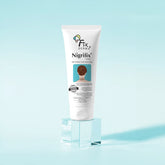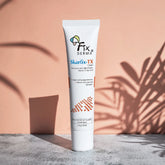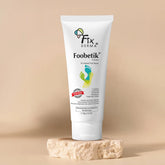FAQs
1. What is Kojic Acid and how does it work?
Kojic Acid is a naturally derived skincare ingredient that helps brighten skin and reduce dark spots. It works by inhibiting melanin production, which reduces hyperpigmentation, age spots, and discoloration.
2. Is Kojic Acid safe for all skin types?
Yes, Kojic Acid is generally safe for most skin types, including oily, dry, and sensitive skin. However, it's always recommended to do a patch test before using any new product.
3. What are the benefits of using Kojic Acid for skin?
Kojic Acid offers multiple benefits, such as reducing hyperpigmentation, brightening dark spots, evening out skin tone, and minimizing the appearance of melasma and sun damage.
4. How can I incorporate Kojic Acid into my skincare routine?
You can incorporate Kojic Acid in your routine by using serums, creams, or soaps that contain it. Apply a thin layer after cleansing, and follow up with sunscreen during the day.
5. Can Kojic Acid be used for dark spots and hyperpigmentation?
Yes, Kojic Acid is highly effective in treating dark spots, age spots, and hyperpigmentation by lightening the skin and promoting an even skin tone.
6. How long does it take for Kojic Acid to show results?
Typically, it can take 4 to 6 weeks of consistent use to see visible improvements in skin tone and texture, though results may vary depending on individual skin conditions.
7. Can I use Kojic Acid with other skincare ingredients?
Yes, Kojic Acid can be used alongside other ingredients like Vitamin C and hyaluronic acid. However, avoid using it in combination with strong exfoliants or products that cause irritation.
8. Is Kojic Acid effective for acne scars?
Kojic Acid can help lighten acne scars by inhibiting melanin production, which helps reduce the appearance of dark spots caused by acne.
9. Does Kojic Acid cause skin irritation?
Kojic Acid is generally well-tolerated, but some people may experience mild irritation, redness, or dryness. It’s always recommended to patch test and use sunscreen, as Kojic Acid can increase sensitivity to sunlight.
10. Can Kojic Acid be used on sensitive skin?
Kojic Acid can be used on sensitive skin, but it’s best to start with a lower concentration and perform a patch test to ensure compatibility with your skin.
11. Is Kojic Acid safe during pregnancy?
Consult your healthcare provider before using Kojic Acid during pregnancy, as it is always important to ensure the safety of skincare ingredients during this period.
12. How does Kojic Acid compare to other skin-brightening ingredients?
Kojic Acid is considered one of the most effective natural skin-brightening ingredients, with a gentler effect compared to alternatives like hydroquinone, but still provides noticeable results in treating dark spots and uneven skin tone.
13. Does Kojic Acid help with melasma?
Yes, Kojic Acid can lighten the pigmentation caused by melasma and help in achieving a more even skin tone.
14. Can I use Kojic Acid at night?
Yes, Kojic Acid is best used at night after cleansing and before moisturizing. This is because it can make your skin more sensitive to sunlight, and nighttime application reduces the risk of sun exposure.
15. What products in the Fixderma Kojic Acid collection are recommended for daily use?
The Fixderma Kojic Acid serums, creams, and soaps are all suitable for daily use. However, you should always apply sunscreen during the day, especially when using products with Kojic Acid.
16. Is Kojic Acid suitable for people with dark skin?
Yes, Kojic Acid is effective for people with dark skin tones, as it helps in treating hyperpigmentation, dark spots, and uneven skin tone.
17. Can Kojic Acid lighten dark circles?
While Kojic Acid can help lighten dark circles caused by hyperpigmentation, results may vary. It is best used in combination with other treatments for under-eye care.
18. How do I use Kojic Acid products for the best results?
For optimal results, incorporate Kojic Acid into your skincare routine by using it consistently, combining it with other brightening ingredients, and always applying sunscreen to protect your skin from sun damage.
Fixderma Kojic Acid Skincare Collection: Brighten, Even Out, and Renew Your Skin
Achieve a glowing, even-toned complexion with Fixderma’s Kojic Acid skincare collection, expertly formulated to target pigmentation, dark spots, and hyperpigmentation. If you’re looking for a safe and effective solution for brighter, clearer skin, our Kojic Acid products are designed to help you achieve noticeable results. Shop now to experience smoother, radiant skin with Fixderma.
Why Choose Kojic Acid for Your Skincare Routine?
Kojic acid, a naturally derived ingredient from fungi and fermented rice, is well-known for its skin brightening and anti-pigmentation properties. It works by inhibiting the production of melanin, helping reduce the appearance of dark spots, age spots, and acne scars. Perfect for individuals seeking to improve skin tone and texture, Kojic acid is gentle on the skin, making it suitable for daily use.
Key Benefits of Fixderma Kojic Acid Products
-
Brighten Dull Skin: Kojic acid helps lighten dark spots and pigmentation, promoting an even skin tone.
-
Fight Hyperpigmentation: Whether from acne scars or sun exposure, Kojic acid targets and fades hyperpigmentation for a clear complexion.
-
Antioxidant Protection: Packed with antioxidants, our Kojic acid skincare products defend your skin against environmental damage.
-
Gentle & Effective: Safe for all skin types, including sensitive skin, Kojic acid exfoliates and nourishes without irritation.
-
Smooth, Soft Texture: Regular use helps improve skin texture, leaving it smooth and refreshed.
Fixderma Kojic Acid Skincare Range
Explore our range of Kojic acid-infused products formulated to address various skin concerns:
How to Use Kojic Acid for Best Results
-
Cleansing: Start with Fixderma Kojic Acid Face Wash to cleanse your skin of impurities and prepare it for treatment.
-
Treatment: Apply Fixderma Kojic Acid Face Serum to clean, dry skin. Gently massage in circular motions for better absorption.
-
Moisturize: Follow up with Fixderma Kojic Acid Cream for deep hydration and long-lasting skin brightening.
Why Fixderma Kojic Acid Collection is the Best for You
Fixderma offers a high-quality, effective solution for those dealing with pigmentation issues. Our products are carefully crafted with the finest ingredients to ensure you get the best results. Unlike other harsh products that can irritate the skin, Fixderma Kojic Acid is gentle yet powerful, providing a solution to your skin concerns without compromising on quality.
Real Results, Real Customers
Customer Reviews: “After using the Fixderma Kojic Acid Face Serum for just a month, I noticed a huge difference in my skin tone. Dark spots faded, and my skin felt so much smoother and brighter!” - Priya S.
“I’ve struggled with uneven skin tone for years, but Fixderma’s Kojic Acid products really work. My skin is glowing, and the dark spots from acne have reduced significantly.” - Rahul M.
Shop Fixderma Kojic Acid Collection Today
Don’t wait to experience the magic of Kojic Acid for your skin. Whether you have dark spots, pigmentation, or uneven skin tone, Fixderma’s Kojic Acid skincare range is here to transform your skin. Shop now and enjoy clear, radiant skin with the power of Kojic Acid.



































